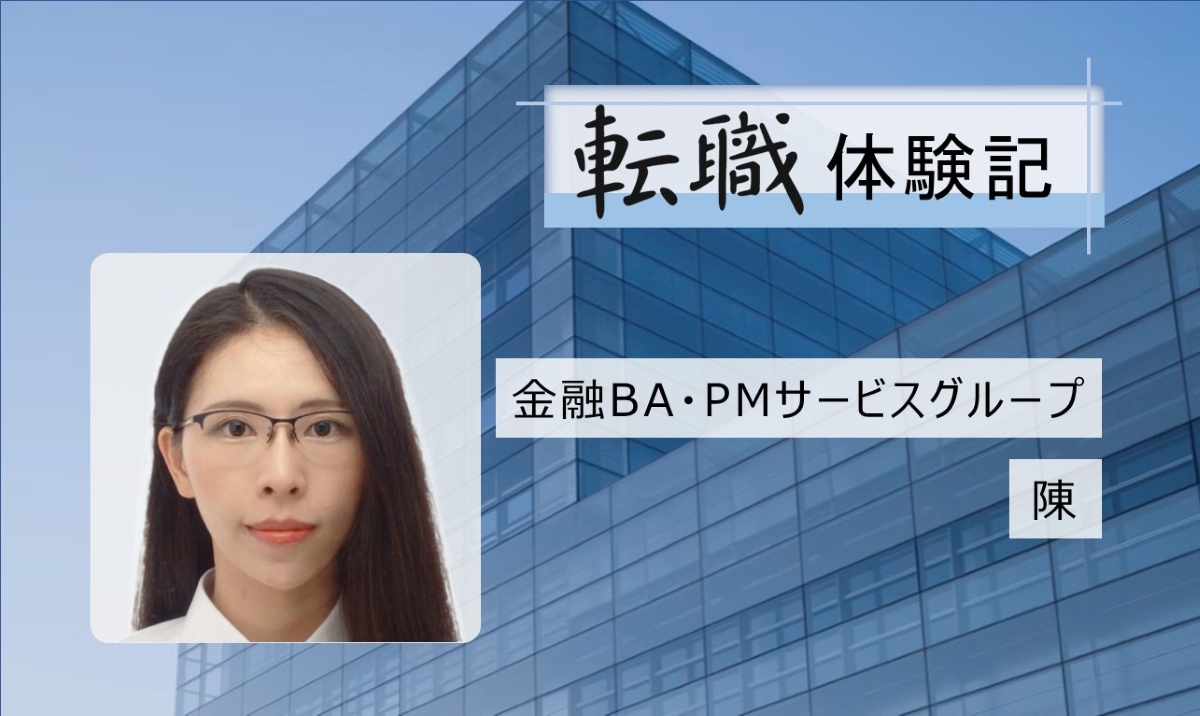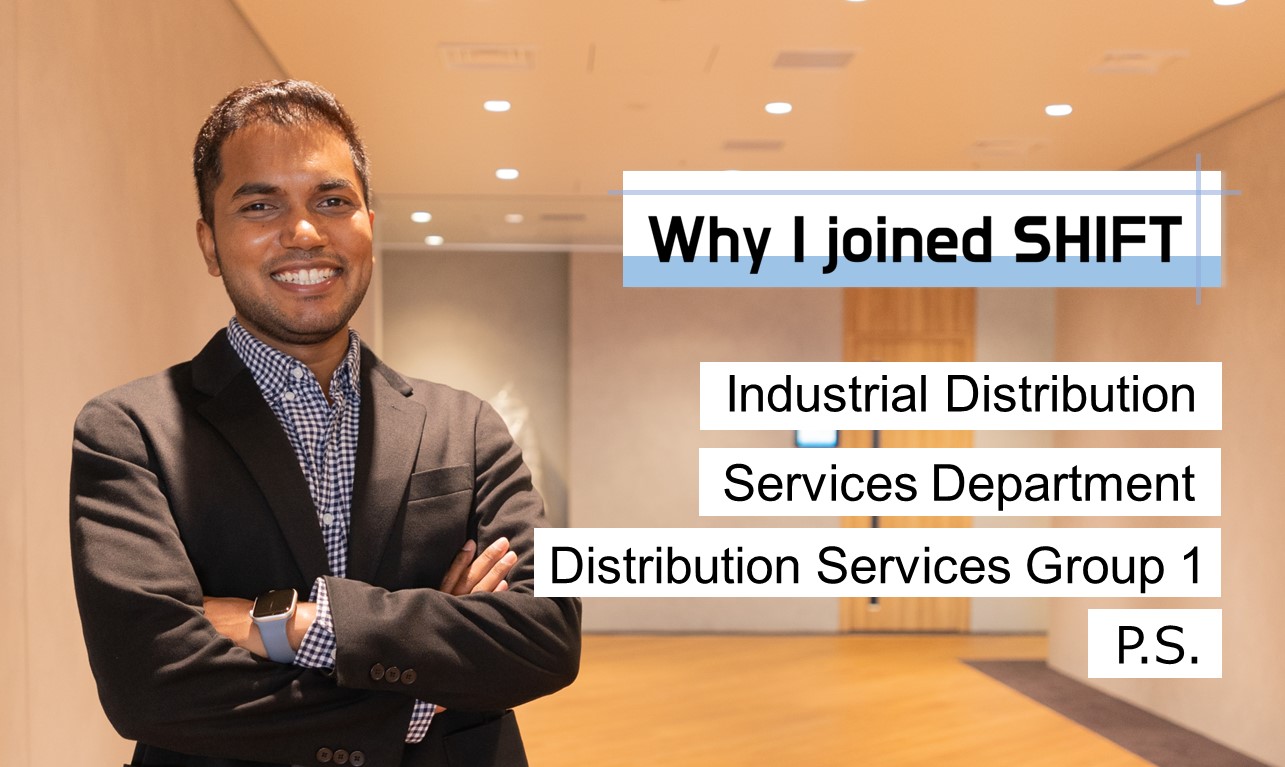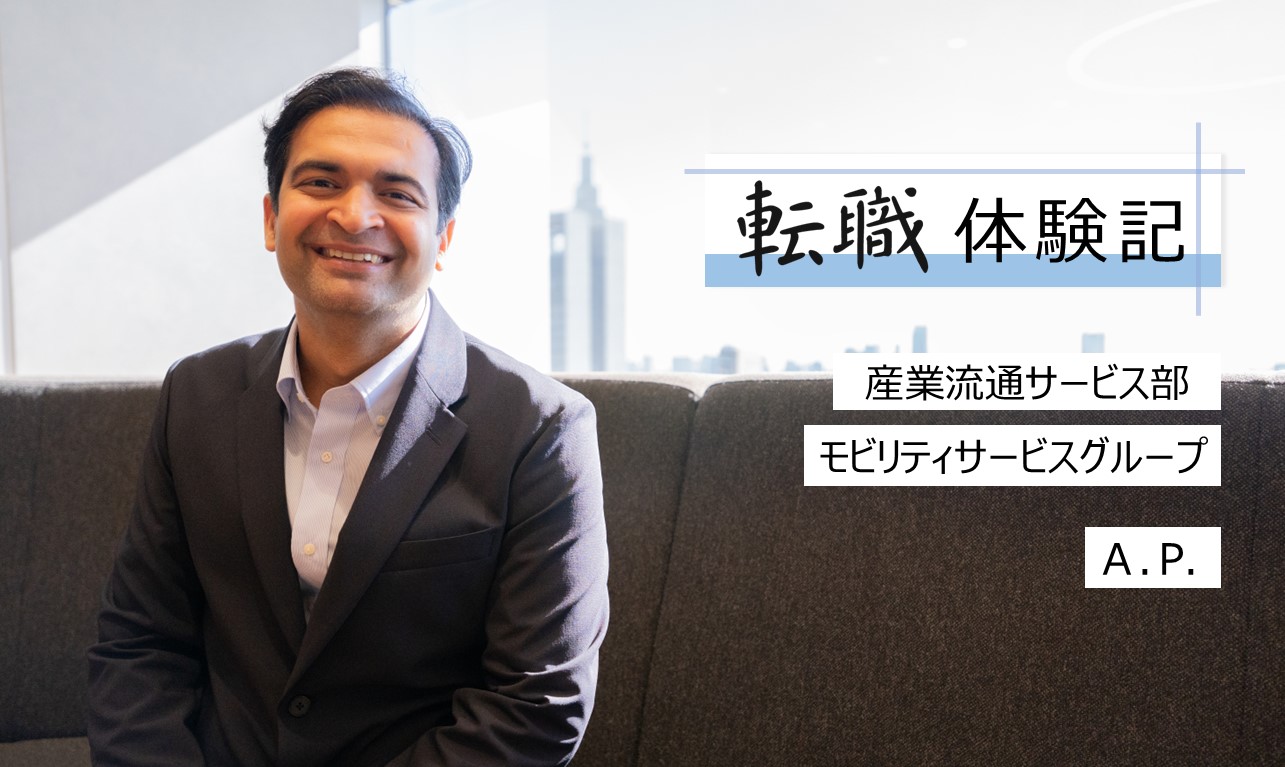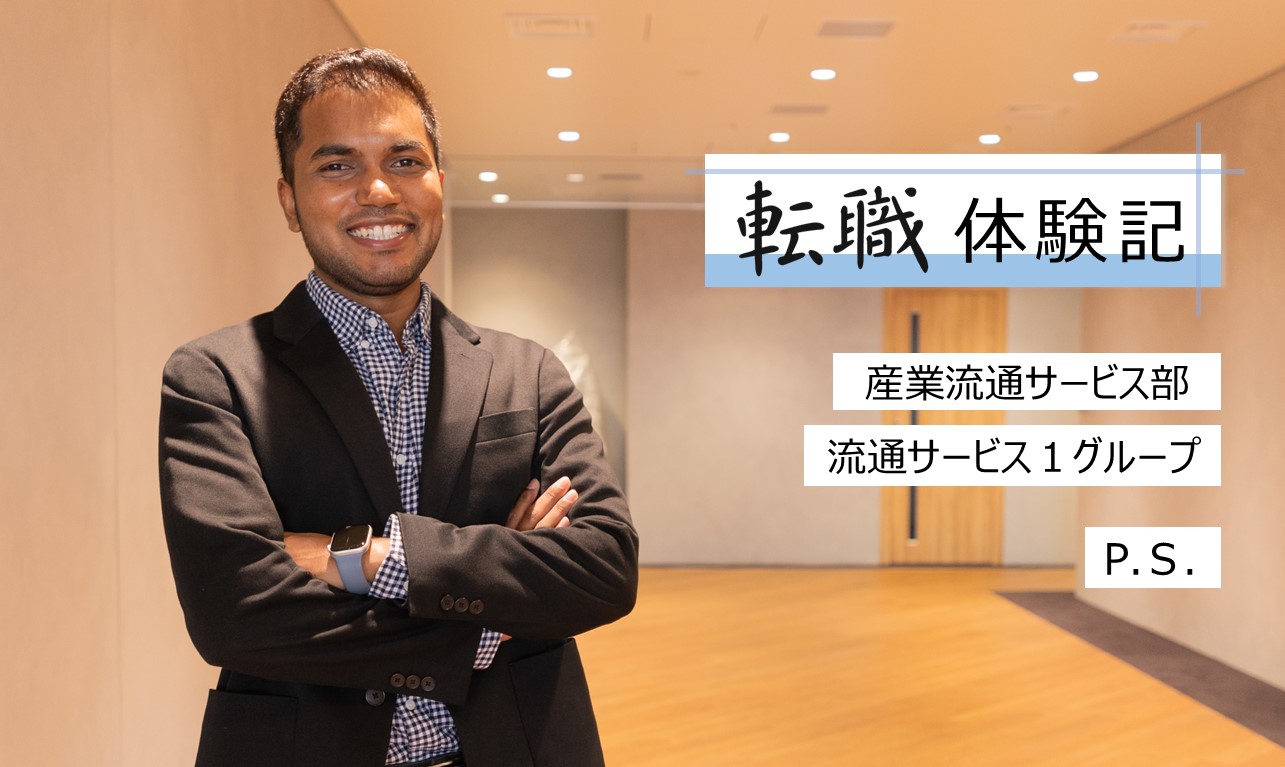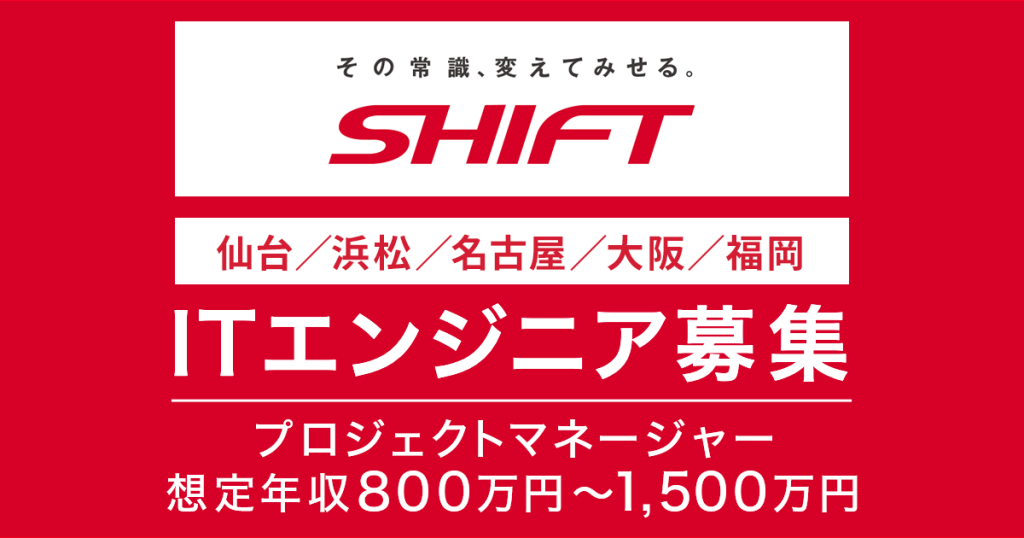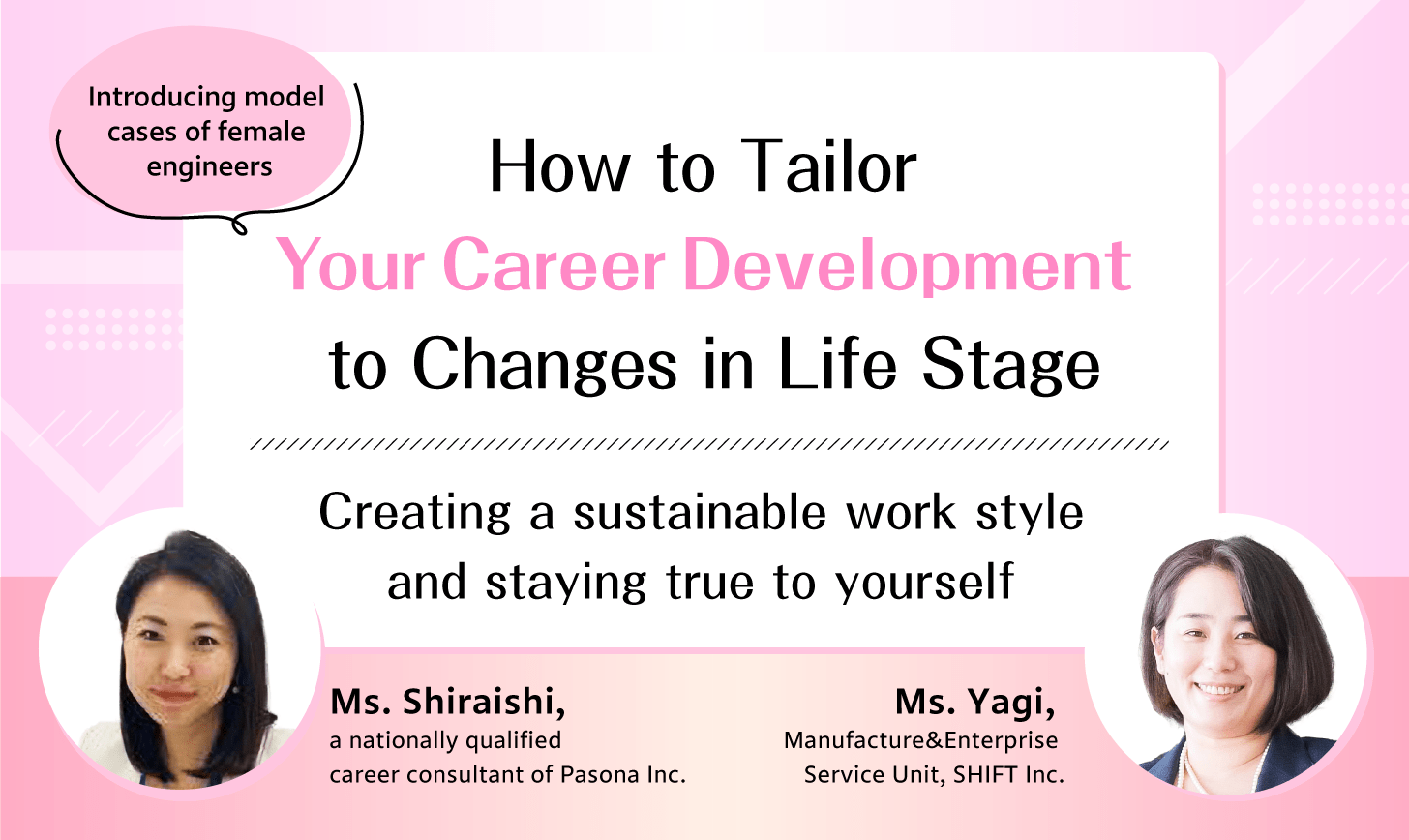
How to Tailor Your Career Development to Changes in Life Stage: Creating a sustainable work style and staying true to yourself
This article recaps a webinar hosted by SHIFT called “How to Tailor Your Career Development to Changes in Life Stage.”
Moderated by a member of the SHIFT HR team, the event featured two speakers: Ms. Shiraishi, a nationally qualified career consultant in the Career Advantage Division of Pasona Inc., and Ms. Yagi, who joined SHIFT’s Manufacture & Enterprise Service Unit after a change in life stage.
They discussed changes in the environment surrounding female engineers and shared career stories from the perspective of “mama engineers.”
Insights on the Female Job Market and Organizing Your Thoughts
In the first half of the webinar, Ms. Shiraishi, a career consultant with Pasona, spoke about the “How To” of career development.
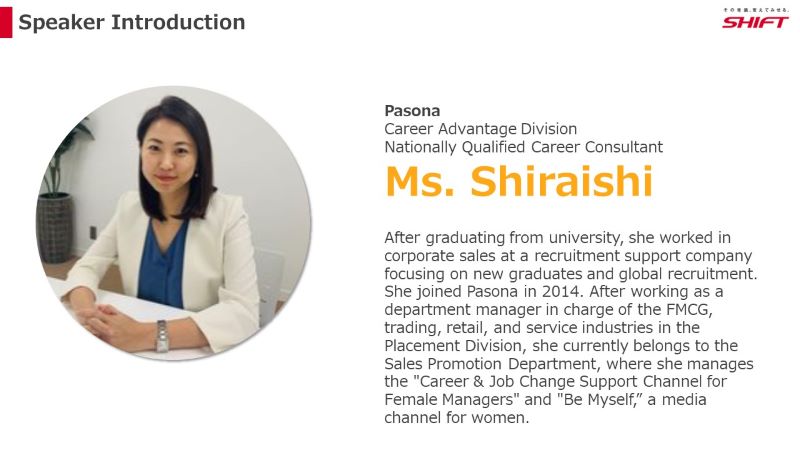
Ms. Shiraishi: Demand for IT engineers is expected to increase.
The need for DX, the focus on Web 3.0, and the 2050 problem will continue to drive demand, and the job market will remain highly competitive.
As a result, companies are reforming their work styles, including their personnel systems and benefits packages.
Do you have any examples from your company?
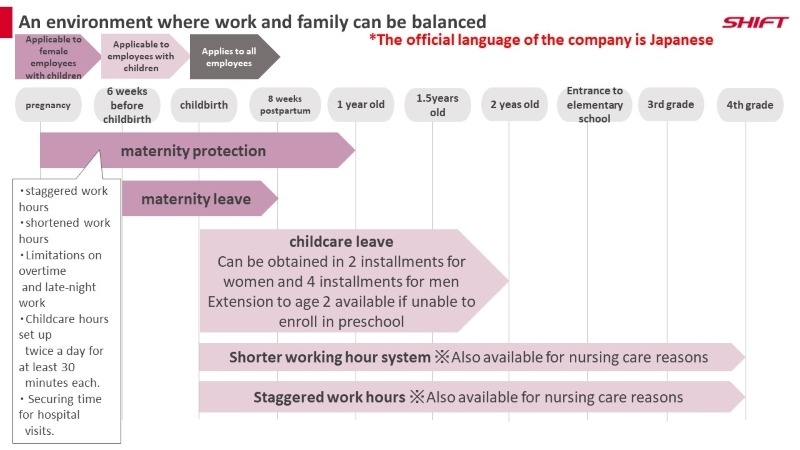
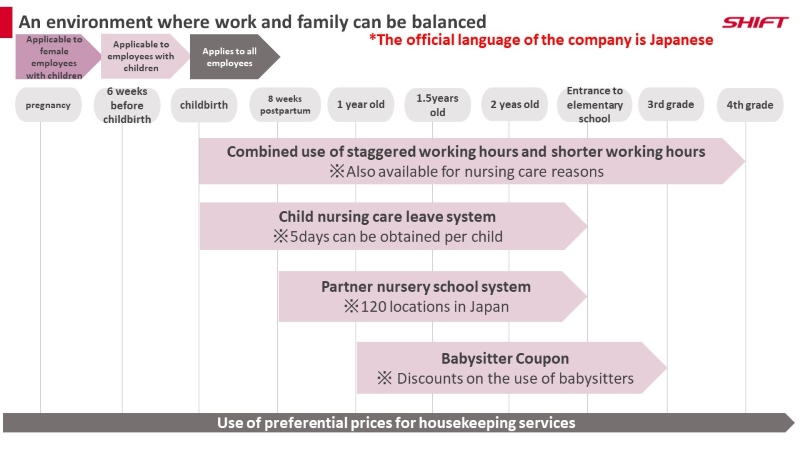
SHIFT HR: As shown in the above graphic, we have several systems to support employees through various life stages.
These include maternity, paternity, childcare, and caregiver leave along with arrangements to shorten or stagger working hours to care for family.
Parents can also utilize coupons to reduce babysitting costs, and all employees have access to preferential rates for housekeeping services.
Time is valuable, and to make the most of it, we can take paid leave hourly increments.
This helps employees adjust their workday to accommodate family commitments, for example, taking an hour off to attend a parent-teacher conference at school.
Ms. Shiraishi: I get the impression that SHIFT has systems tailored to each situation, and many employees are family-oriented.
Even as company policies evolve, navigating a change in life stage can bring an opportunity to reflect on your career and redefine your goals for building that career while balancing work and family.
Today, I would like to introduce two ways of organizing your thoughts to help you in this process.
The first is to consider being before doing, and the second is to take a career inventory using the Will-Can-Must framework.
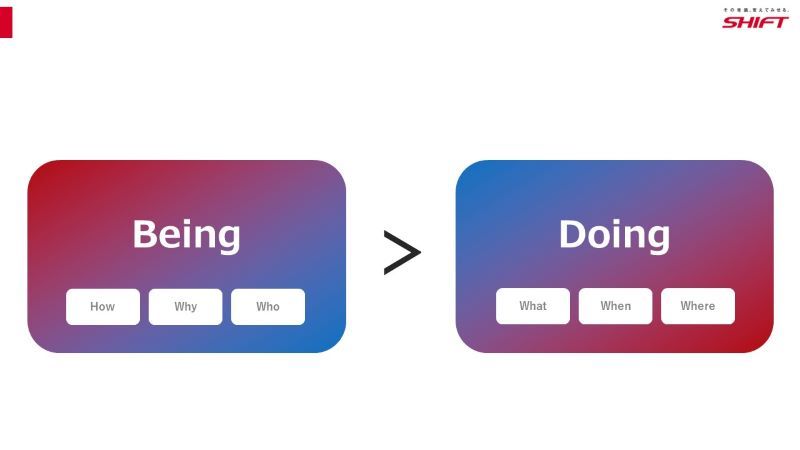
1. Consider “Being” Before “Doing”
Ms. Shiraishi: For example, if you have a problem at work, you might think about the actions that need to be taken to resolve it––what to do and by when.
However, when organizing your thoughts, giving priority to doing can narrow your perspective and make it difficult to see what you really need. I recommend that you think about being first.
Clarifying your decision criteria and values will make it easier to identify appropriate actions worthy of doing.
Only after you know how you want to be in a situation can you consider what you want to do about it. And it is very important to put this thought process down in writing.
2. Take Inventory using the Will-Can-Must Framework
Ms. Shiraishi: I recommend that you periodically review your career from the perspective of the things that you hope to do (will), your strengths (can), and your responsibilities (must).
Check how much overlap you have between these three categories––highly satisfying work is typically where these three categories are in alignment.
When there is little overlap, it may be time to consider making a change.
Some people approach their ideal image by taking on a second job or volunteering, while others take the plunge and change their environment by changing jobs.
By organizing and taking stock of your thoughts regularly, I hope you will be able to take aligned action toward the career you want to build.
Career Transition Story as a “Mama Engineer”
From here, Ms. Yagi from SHIFT spoke about career transitions and her story as a female engineer.
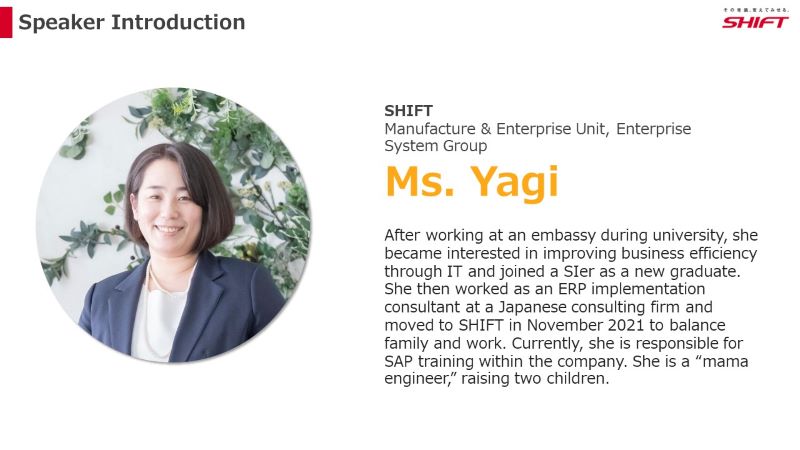
A member of the Enterprise Services Department, Ms. Yagi is responsible for SAP training at SHIFT.
After joining a SIer as a new graduate, she worked as an ERP implementation consultant at a Japanese consulting firm and joined SHIFT three years ago when a change in life stage led her to consider a career change. She is a “mama engineer,” raising two children.
SHIFT HR: To start, please tell us about your career.
Ms. Yagi: The first company I worked for was a banking SIer. After experiencing several projects, I decided that I wanted to be involved in system implementation consulting rather than program development, so I changed jobs. At the consulting company, my days were busy, but the work was fulfilling.
I returned from maternity leave first in 2015 and then again in 2020, but after the second leave, the environment had changed completely, and the workload was quite high.
This change was due to a combination of being promoted to manager just before having my second child, increased responsibilities, and a change in the products I was responsible for.
I began a full-fledged job search to change how I was working, and at that time, SHIFT was looking for a trainer in their SAP team. In this position, I would be able to utilize the skills I had cultivated in SAP consulting.
At the same time, since the work is mainly for internal use and is easy to control, I thought the work environment would match my desire to have minimal overtime.
On top of that, I had the experience of participating in a project that went up in flames after release due to insufficient testing.
Through SHIFT’s quality assurance activities, I wanted to help prevent similar issues on future SAP projects.
SHIFT HR: What was your experience like after joining SHIFT? Did your motivation or career development change?
Ms. Yagi: Looking back, I guess there were some ups and downs on the motivation curve.
After joining the company, I could make use of my previous experience and proceed with my work stably.
However, my motivation declined at a time when I was having difficulty allocating time to three projects at the same time.
From there, I gradually recovered, but my first boost in motivation was when I won a Rookie of the Year award.
I was also happy to receive recognition for releasing an in-house certification test, one of the three projects I was working on.
In the following fiscal year, the project I was working on was canceled and some cases required overtime work.
It was not always smooth, but when I received the “Unsung Hero” award at the end of the year, I was glad that I had persevered.
I was honored to be recognized in this way for internal initiatives.
My motivation went up and down, but I valued having a weekly 1-on-1 cadence with my manager. Talking to my teammates and colleagues in the morning meeting has also been important.
And when I needed help, I consulted with my supervisor and received a quick response. It is a supportive environment where you feel that managers are approachable.
Another motivating factor throughout this time has been the SHIFT events designed to incorporate our families.
Employees can participate in offers like summer vacation programs or workcation planning, which refresh and enrich their time with their children.
SHIFT HR: Ms. Yagi, thank you for speaking with us!
Link: SHIFT AWARD (in Japanese)
Link: SHIFTOMO kids (in Japanese)
At the end of the discussion, we introduced SHIFT’s human resource management tool, “Hito-log,” which collects data to provide insight into more than 450 performance indicators.
To ensure each employee progresses toward their career goals at their desired speed, we have regular discussions to understand these preferences and ensure their work is well-aligned.
For example, when an employee wants to concentrate on childcare, they may choose to grow at a slower pace.
Then, when they feel the timing is right to accelerate their development goals, they can update their plan.
We approach each employee as an individual and collaborate to ensure their role is tailored to their life stage and career development goals.
Q&A Session
Finally, we moved on to the Q&A session. Here are some of the questions that were asked;
–––I understand that you have various systems in place, but when you have a situation like suddenly needing to leave work because your child has a fever, does the atmosphere make it easy to utilize these accommodations?
SHIFT HR: I have children myself, and have been in that situation many times. It’s my personal experience, but I am comfortable leaving right away.
Ms. Yagi: I have teammates who also have children, and we can leave with no problem, too.
SHIFT HR: I think we have a culture that takes the circumstances of families into account.
We also have a community of parents within the company, where lots of information related to child-rearing is exchanged.
–––A question for Ms. Yagi: Did you have any resistance to losing your position as a manager or senior consultant when you changed jobs?
Ms. Yagi: One of the reasons I considered changing jobs was to reduce the workload associated with the position, so I had no particular resistance.
When I was approached about stepping up into a management role at my previous job, I honestly felt that it might be premature.
On the other hand, I accepted it because I thought it would enhance my market value when considering my future career.
The decision I made at the time was to increase my future career options.
I chose to join SHIFT because I wanted to prioritize my own way of working without any fixation on a managerial position.
–––I am currently based in Tokyo, but if I moved after joining SHIFT, would I be able to continue with the same work?
SHIFT HR: We have had employees who have moved to a rural area after joining the company.
In some cases, employees were reassigned to the nearest office and continued to work on the same projects from that location.
We received many questions afterward, and we hope many participants became interested in SHIFT as a company.
SHIFT is a company that has a strong culture of dealing with each employee individually so that they can achieve the way they want to work as their life stages change.
If you are interested in SHIFT, we invite you to join us for a casual conversation. We hold weekly information sessions especially for female engineers,which are open to all regardless of whether you are interested in applying.
Please check out our career events page!
Link: Information session for female engineer (in Japanese)
(Note: The contents of this article and the affiliations of the interviewees are as of the time of the interview.)







